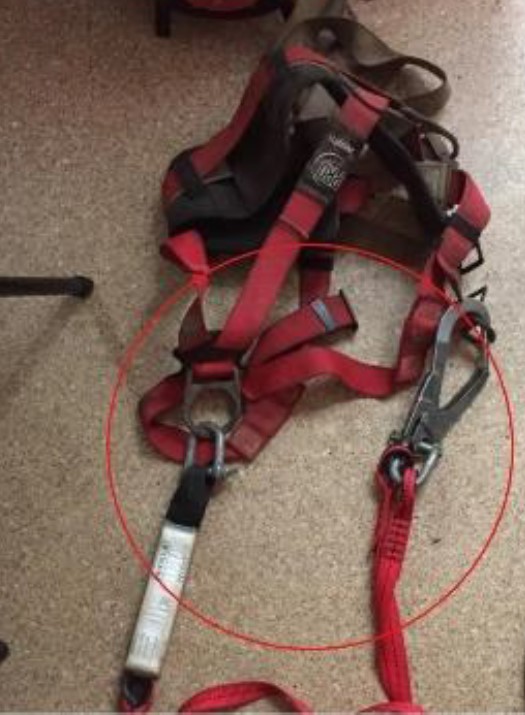Two incidents relating to the condition of personal protective equipment
Here are two incidents reported by two different contractors, relating to the condition of personal protective equipment.
Incident 1: Defective Safety Harness
What happened
During a site visit, a third-party owned safety harness was found inside a container of the barge. The harness was without the manufacturer’s tag and with cargo D-shackles on the lanyard instead of proper carabiners. The safety harness could potentially have been used, posing risk to the crew members who used it. The safety harness was immediately taken out of service.
Causes
- Ineffective checks on safety harnesses;
- Crew members did not quarantine or properly label defective safety harness;
- There was no designated quarantine space on the barge.

Recommendations
- Crew on board reminded of the need for regular inspection of the safety harnesses;
- Defective safety harness removed from use immediately – remove and quarantine any defective equipment immediately. Any doubt at all about the safety of the equipment, don’t use it!
- Dedicated quarantine spaces (boxes) for defective equipment and tools to be arranged on board barges.
Further worthwhile reminders on PPE in general:
- How PPE works: Fire and thermal protection
- Personal injury following PPE violation and slip and fall on deck
- Crewman suffers cut to hand – but gloves prevented it being much worse
Incident 2: Safety helmet found to be several years past its storage life expiry date
While cleaning a storage cabinet onboard a vessel, a safety helmet retained for use by visitors was found to be several years past its storage life expiry date. This prompted the inspection of all in-use and stored/spare safety helmets onboard the vessel. The inspection identified five helmets which were past their recommended in-use life and three helmets past their storage life. Several safety helmet suspension systems were also found to be defective – faulty ratchet adjusters and torn webbing. An inspection on onboard another vessel working on the same project also found several out of date and defective safety helmets.

Lessons learned
- Safety helmets don’t last forever – remember it’s your head and your life the helmet protects!
- There was inadequate management of in-use and stored safety helmets resulted in safety helmets which had exceeded their storage/in-use life, and/or were defective, still being available for use;
- A standard/conventional safety helmet consists of two components – the shell and the suspension – which work together as a system. When in-use both components require periodic inspection and maintenance in accordance with the manufacturer’s instructions. Lack of familiarisation training in the inspection, use and storage of safety helmets can lead to defects not being identified or reported.
Actions
- Members are encouraged to check the procurement, storage and use of safety helmets;
- The storage-life and in-use life of a safety helmet is determined by the manufacture and whilst only a recommendation, should be followed;
- Spare safety helmets should be stored in accordance with the manufacturer’s instructions. Exceeding the storage life will reduce its in-use life accordingly. Stock levels should be kept to a minimum and storage conditions monitored;
- When not being worn, in-use safety helmets should be stored safely and protected from damage.
Members may wish to refer to
- The wear and care of safety helmets
- Checking of safety helmets
- Near-miss: falling object [a falling object struck the hard hat of a worker piercing and destroying the hard hat. He himself was uninjured].
Safety Event
Published: 2 February 2021
Download: IMCA SF 04/21
IMCA Safety Flashes
Submit a Report
IMCA Safety Flashes summarise key safety matters and incidents, allowing lessons to be more easily learnt for the benefit of all. The effectiveness of the IMCA Safety Flash system depends on Members sharing information and so avoiding repeat incidents. Please consider adding [email protected] to your internal distribution list for safety alerts or manually submitting information on incidents you consider may be relevant. All information is anonymised or sanitised, as appropriate.
IMCA’s store terms and conditions (https://www.imca-int.com/legal-notices/terms/) apply to all downloads from IMCA’s website, including this document.
IMCA makes every effort to ensure the accuracy and reliability of the data contained in the documents it publishes, but IMCA shall not be liable for any guidance and/or recommendation and/or statement herein contained. The information contained in this document does not fulfil or replace any individual’s or Member's legal, regulatory or other duties or obligations in respect of their operations. Individuals and Members remain solely responsible for the safe, lawful and proper conduct of their operations.
